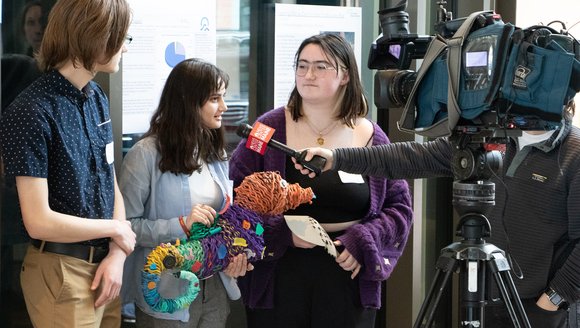A Summer of Supporting Educators
Tidings | Aug 26, 2024
While students are enjoying summer break, educators statewide are honing their skills around engaging youth on topics of climate change and data literacy. Learn how we supported teachers this summer here.

Supporting the teachers, librarians, and out-of-school educators who work with youth on a daily basis is a fundamental element of our education team’s work. This summer, we led a flurry of professional learning opportunities for formal and informal educators, to help increase their confidence and competence working with youth around climate change and data literacy.
While GMRI is known for our ocean-focused research and engagement with coastal communities, we recognize that in order to achieve our organizational goal of nurturing the next generation of ecosystem stewards, we need to bring STEM skills to students' backyards — the majority of which are miles away from the shoreline. In order to make learning about climate and data literacy work for everyone, we need to engage students with science that is relevant for their lives, schools, and communities. That’s why our education team creates curriculum and professional development opportunities that go beyond the ocean and into fields, forests, farms, and freshwater ecosystems.
Read on to see a few examples of the professional learning opportunities our education team provided this year.


Ash and Hemlock Stewardship
In July, for example, we brought together educators and project partners for the second summer in a row for a workshop focused on ash and hemlock stewardship. Fourteen teachers of students grade 3 through 12 along with partners from the Ash Protection Collaboration Across Wabanakik lab at the University of Maine, the Wild Seed Project, and the Maine Department of Conservation, Agriculture, and Forestry shared knowledge about threats to forest health and gathered resources to prepare students to lead forest stewardship actions across the state. During the program, teachers learned about Wabanaki leadership in protecting ash trees from the emerald ash borer and analyzed data related to warming temperatures and the spread of hemlock woolly adelgid. Throughout this coming school year, their students will be collecting, analyzing, and interpreting forest pest data to inform meaningful action.
I love these workshops and incorporating the lessons learned into classroom instruction. Real world learning, content knowledge, and stewardship lessons are valuable and memorable for all! Thank you!
Participating Educator Summer PD
Place-based Learning with NASA Data
Another example of what sets GMRI education work apart from others is our close collaboration with NASA. We use real NASA data sets and connect students and educators with NASA scientists.
For one week in mid-August, through a collaboration with the NASA-funded PLACES project, educators collected, analyzed, and reflected on local data to promote place-based learning. This equipped educators with STEM teaching tools they can bring back to their classrooms that will make learning experiences for their students relevant to local ecosystems around them.


Connected Learning Ecosystems
We also support peer communities of formal and informal educators and learning experience designers across the Northeast who are working together to advance STEM education and foster climate literacy in the next generation. Educators in these communities, called Connected Learning Ecosystems (CLEs), connect regularly, both online and in person, to learn with and from one another in order to increase comfort and confidence around climate change topics in both youth and adults. CLE members work together to engage youth in place-based, locally relevant investigations of ecosystems and climate change that are connected across formal and informal learning spaces.
The week following our PLACES learning opportunity, educators in our CLE program convened at the University of Maine in Orono to learn and share similar teaching practices that will boost their STEM teaching back in the classroom — again with real NASA data and funding.
Before I first joined the CLE I viewed STEM professionals to be separate from myself for the most part because I did not feel very confident in my abilities in all parts of STEM. I feel more comfortable with data and technology, engineering, and science practices now.
Sara King Rural Aspirations Project Hancock/Midcoast CLE



This summer’s professional learning opportunities highlight the key principles that shape our educational programs. We understand that to effectively investigate the impacts of climate change, educators and students must feel confident navigating complex, sometimes messy, information. That’s why we focus on equipping educators with the data, science, and tools they need to build that confidence and handle the uncertainties that come with studying changing ecosystems. We also recognize the value of collaboration, bringing educators and experts together to work through these challenges, whether drawing on scientific research or community-held knowledge.



